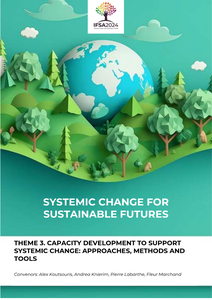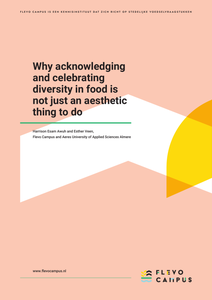The 21st century’s rapidly compounding crises – from climate and ecological breakdown to extreme social inequities of power and opportunity – make it irrefutably clear that the global economic system must be transformed if humanity and the rest of life on Earth are to thrive. Doughnut Economics provides an increasingly recognised compass for such a thriving future, and is focused on meeting the needs of all people within the means of the living planet, by creating economies that are regenerative and distributive by design. What are the implications for the role and transformation of business, if it is to be part of this future?This paper explores how the deep design of business – through a company’s Purpose, Networks, Governance, Ownership, and Finance – powerfully shapesits strategic decisions and operational impacts, and ultimately determines whether or not businesses can transform to become part of a regenerative and distributive future. By diving into five layers of deep design, this paper reveals both design blockages that prevent transformative action, and design innovations that can unlock its possibility. In addition, this paper recognises that industry-level and system-wide transformations are crucial for turning the inheritance of a degenerative and divisive economic system into the beginnings of a regenerative and distributive one.
DOCUMENT

This paper presents an integral assessment tool for the social and ecological embedding of a farm. In transitioning towards sustainable farming systems, a product-baed view as well as a location-based view is needed. The location-based perspective focuses on the combined effects of farming practices on the social and ecological context of the farm. Based on a need expressed in practice, and inspired by Doughnut economics, the FarmingTree Tool was designed. Using a qualitative assessment of on-farm activities for six social and ten ecological themes, this farm assessment tool supports awareness of and communication on the situation of the farm. Testing of the tool in various contexts showed a high added value for communication between the farmer and stakeholders with an interest in the development of the farm. The tool creates a shared understanding of the farm allowing to discuss farm development options in a clear manner with stakeholders with a specific interest in the development of the farm, like local food systems or in a lesser-tenant situation and as well students in farming related studies. The tool strengthens the farmer in conveying the 'story' of the farm in its entirety and its complexity. Keywords: farming, assessment tool, Doughnut Economics, strategy, embedding
DOCUMENT

Het lectoraat Juridische en Economische Vraagstukken binnen de Energietransitie draagt bij aan de overgang naar een duurzame samenleving gebaseerd op het gebruik van schone energiebronnen. Dat vraagt niet alleen om nieuwe technologieën, maar ook om juridische kaders en nieuwe verdienmodellen voor duurzame investeringen in de energiemarkt. Het lectoraat maakt deel uit van ENTRANCE – Centre of Expertise Energy van de Hanze. ENTRANCE – Centre of Expertise Energy draagt als lerende, praktijkgerichte kennisgemeenschap bij aan een robuuste, veerkrachtige en duurzame energievoorziening. Door middel van hoogstaand toegepast onderzoek en onderwijs stimuleren we duurzame innovaties in samenwerking met burgers, bedrijven, studenten, maatschappelijke organisaties en overheden
DOCUMENT

It is believed that recognising and celebrating diversity in our foodscapes is the right thing to do. But why, really? What benefits make it paramount for this diversity to be lauded? This question needs answering to add more legitimacy to promoting urban food diversity. In this essay we try to do so by investigating the link between ‘recognition justice’ – the celebration of diversity –and inclusion, and understanding inclusion as vital for (social) sustainability. We use two research projects to demonstrate empirically-based lessons which can be drawn to support the need to recognise and celebrate diversity in our urban foodscape.
DOCUMENT

In de Solution Rooms bespreken studenten, docenten, beleidsmakers en onderzoekers uitdagingen en oplossingsrichtingen voor het vervolgonderwijs van de toekomst. Eén van de thema's is 'Duurzaamheid', waar Rolien Blanken een wetenschappelijke reflectie over schreef. Twee problemen zijn geïdentificeerd bij doorvoeren van duurzaamheid binnen de instelling en het onderwijs: de complexiteit van het vraagstuk enerzijds en draagvlak en effecten op de studenten anderzijds. Dit bemoeilijkt het duurzaamheidsproces. Inzetten op het gebruik maken van meetinstrumenten voor verduurzaming van curricula, transdisciplinair- en sectoroverstijgend werken en duurzaam burgerschap als uitgangspunt voor studentontwikkeling kunnen helpen om tot een succesvolle verduurzaming te komen. Aandacht voor duurzaamheid in het onderwijs kent een hoge mate van urgentie. De student ervaart hierbij negatieve invloed op het welzijn. Tegelijkertijd is verduurzaming een complex proces. Het doorvoeren van regeneratief onderwijs kan helpen bij het aangaan van genoemde uitdagingen. Naast het meten van de duurzaamheid van het curriculum is aan te bevelen breder in de organisatie duurzaamheid te meten en door te voeren. Het werken met integrated reporting kan hierin bijdragen. Transdisciplinair en sectoroverstijgend werken is een goede oplossing om duurzaamheidstransities te bereiken. Dit kan men toepassen door te werken in labs. In deze omgevingen zijn diverse stakeholders betrokken en kan de student zijn rol als wereldburger hier in co-creatie vervullen.
MULTIFILE
DOCUMENT

Our planet’s ecology and society are on a collision course, which manifests due to a contradiction in the assumptions of unlimited material growth fueling the linear economic paradigm. Our closed planetary ecosystem imposes confined amounts of space and a finite extent of resources upon its inhabitants. However, practically all the economic perspectives have been defiantly neglecting these realities, as resources are extracted, used and disposed of reluctantly (Ellen MacArthur Foundation 2015). The circular economy attempts to reconcile the extraction, production and usage of goods and resources with the limited availability of those resources and nature’s regenerative capabilities This perspective entails a shift throughout the supply chain, from material science (e g non-toxic, regenerative biomaterials) to novel logistical systems (e g low-carbon reverse logistics). Because of this, the circular economy is often celebrated for its potential environmental benefits and its usefulness as a blueprint for sustainable development (Ellen MacArthur Foundation 2017). Unfortunately, the promise of the circular economy aiming at enhanced sustainability through restorative intent and design (McDonough & Braungart 2010), is often inhibited by institutional barriers posed by the current linear economy of take, make, use and waste (Ghisellini et al. 2016). Underlying those barriers our cultural paradigm celebrates consumerism, exponential growth and financial benefit instead of human values such as diversity, care and trust. Based on a mapping exercise of the circular economy discourse in the Netherlands and an overview of international (academic) literature (Van den Berg 2020) supplemented with collaborative co-creation sessions, visiting events, conferences, giving talks and classes, we have defined a gap leading to the focus of the Professorship. First, we highlight the importance of a process approach in studying the transition from a linear to a circular economy, which is why we use the verb ‘entrepreneuring’ as it indicates the movement we collectively need to make. The majority of work in the field is based on start-ups and only captures snapshots while longitudinal and transition perspectives - especially of larger companies - are missing (Merli et al. 2019; Geissdoerfer et al. 2018; Bocken et al. 2014). We specifically adopt an entrepreneurship-as-practice lens (Thompson, Verduijn & Gartner 2020), which allows us to trace the doings – as opposed to only the sayings - of organizations involved in circular innovation. Such an approach also enables us to study cross-sector and interfirm collaboration, which is crucial to achieve ecosystem circularity (Raworth 2019). As materials flow between actors in a system, traditional views of ‘a value chain’ slowly make way for an ecosystem or value web perspective on ‘organizing business’. We summarize this first theme as ‘entrepreneurship as social change’ broadening dominant views of what economic activity is and who the main actors are supposed to be (Barinaga 2013; Calás, Smircich & Bourne 2009; Steyaert & Hjorth 2008; Nicholls 2008). Second, within the Circular Business Professorship value is a big word in two ways. First of all, we believe that a transition to a circular economy is not just a transition of materials, nor technologies - it is most of all a transition of values We are interested in how people can explore their own agency in transitioning to a circular economy thereby aligning their personal values with the values of the organization and the larger system they are a part of Second, while circularity is a broad concept that can be approached through different lenses, the way in which things are valued and how value is created and extracted lies at the heart of the transition (Mazzucato 2018). If we don’t understand value as collectively crafted it will be very hard to change things, which is why we specifically focus on multiplicity and co-creation in the process of reclaiming value, originating from an ethics of care Third, sustainability efforts are often concerned with optimization of the current – linear – system by means of ecoefficient practices that are a bit ‘less bad’; using ’less resources’, causing ‘less pollution’ and ‘having less negative impact’. In contrast, eco-effective practices are inherently good, departing from the notion of abundance: circular thinking celebrates the abundance of nature’s regenerative capacities as well as the abundance of our imagination to envision new realities (Ellen MacArthur Foundation 2015). Instead of exploiting natural resources, we should look closely in order to learn how we can build resilient self-sustaining ecosystems like the ones we find in nature. We are in need of rediscovering our profound connection with and appreciation of nature, which requires us to move beyond the cognitive and employ an aesthetic perspective of sustainability This perspective informs our approach to innovating education: aesthetics can support deep sustainability learning (Ivanaj, Poldner & Shrivastava 2014) and contribute to facilitating the circular change makers of the future. The current linear economy has driven our planet’s ecology and society towards a collision course and it is really now or never: if we don’t alter the course towards a circular economy today, then when? When will it become urgent enough for us to take action? Which disaster is needed for us to wake up? We desperately need substitutes for the current neo-liberal paradigm, which underlies our linear society and prevents us from becoming an economy of well-being In Entrepreneuring a regenerative society I propose three research themes – ‘entrepreneurship as social change’, ‘reclaiming value’ and ‘the aesthetics of sustainability’ – as alternative ways of embracing, studying and co-creating such a novel reality. LinkedIn: https://www.linkedin.com/in/kim-poldner-a003473/
MULTIFILE

The book captures the response of the Northern Netherlands region to major socio-economic and technological challenges of our time.
DOCUMENT

At present, leading international agencies, such as the United Nations Environmental Programme, are largely focused on what they claim to be ‘win-win’ scenarios of ‘sustainable development’ rhetoric. These combine social, economic and environmental objectives. However, as noted by the ‘Scientists’ Warning to Humanity’, environmental integrity is the essential precondition for the healthy functioning of social and economic systems, and thus environmental protection needs to be prioritized in policy and practice. Ecological sustainability cannot be reached without realizing that population growth and economic growth, with attendant increased rates of depletion of natural resources, pollution, and general environmental degradation, are the root causes of unsustainability. This article argues that to strategically address ecological unsustainability, the social, economic and political barriers to addressing the current economic model and population growth need to be overcome. Strategic solutions proposed to the current neoliberal economy are generic – namely, degrowth, a steady-state economy, and a ‘circular economy’. Solutions to demographic issues must be sensitive to the countries' cultural, social, political and economic factors to be effective as fertility differs from country to country, and culture to culture. As discussed here, Mediterranean countries have the lowest fertility in the world, while many countries in Africa, and some in Asia, South America have stable but consistently high birthrates. This is discussed using three case studies - Tanzania, Italy, and Cambodia, focusing on the "best case" policy practice that offers more realistic hope for successful sustainability. https://doi.org/10.1007/s41207-019-0139-4 LinkedIn: https://www.linkedin.com/in/helenkopnina/
MULTIFILE
